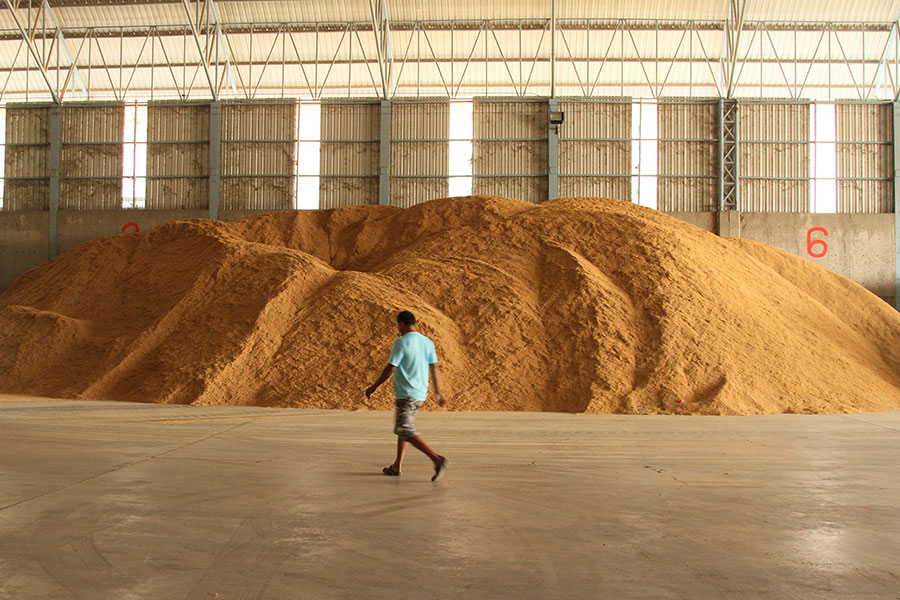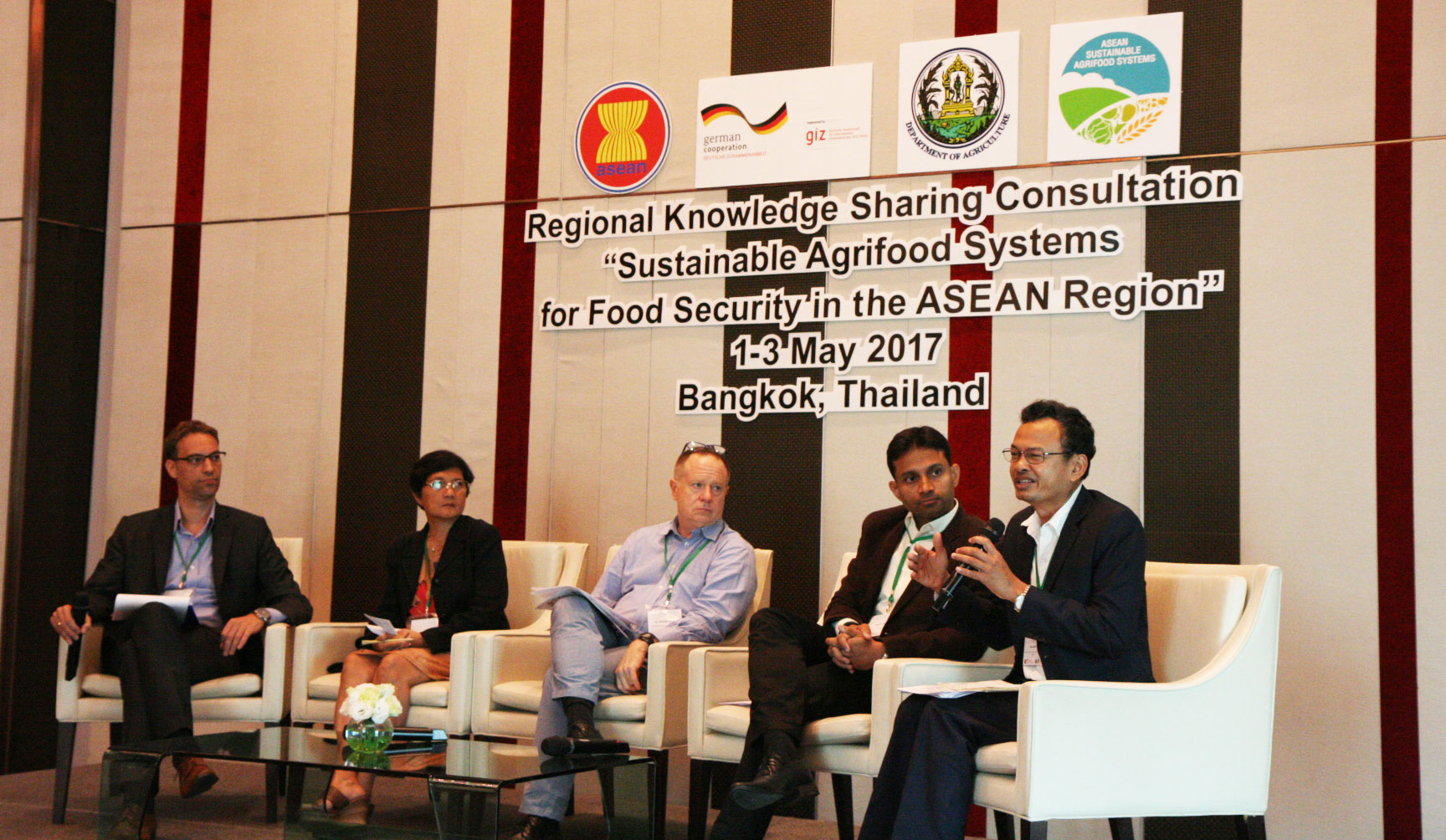
Writer: Bas Merten, Intern supporting the evaluation and presentation of end-results from the ASEAN Sustainable Agrifood Systems (ASEAN SAS) Project
Olam International, a global agri-business, shared a method to produce its products and raw materials sustainably without the need to increase their eventual product price. At the same time, they have also managed to increase farmer income, Olam’s profits and product quality.
This does not only make sustainable and high quality products available for every consumer, but also provides a possible path way for the wider promotion of sustainability within the private sector.[1]
Although some consumers are already willing to pay more for a sustainably produced product, many are still not able to pay such extra charges or price premiums. In addition, especially now that consumers are more aware of environmental problems and food safety issues, they want more information and more transparency about the origins and production of their food. Companies are often struggling to provide this due to the complexity of food production and the many actors involved in processing the raw materials.
High prices and a lack of transparency are, therefore, barriers for many consumers to be willing to buy the so called sustainably produced product.
On the other side of the spectrum, companies are often hesitant to invest in sustainable practices or technologies because they still view it as an additional production cost. This idea is the result of dominant economic theory arguing that negative side effects from a production process, like greenhouse gas emissions, can be accounted for by adding its mitigation costs to the production process of a product.[2] To then ensure a profit, prices need to increase, which is risky since it is often unclear how consumers will respond to these price increases. Although, there is evidence that suggests that if a company can proof it is sustainable, prices can be raised by almost 20 per cent in order to maximize revenues and make a return on investments to cover the initial costs.[3]
Olam International is one of the companies that has developed an anti-thesis to this theory and regards sustainability as an opportunity rather than a cost. The company is an agri-business that supplies agricultural raw materials to customers around the world and covers most of the supply chain from farmers until its customers, which include supermarkets and large consumer good companies like Unilever. At the recent the Regional Knowledge Sharing Consultation “Sustainable Agrifood Systems for Food Security and Sustainable Development in the ASEAN Region” organised by ASEAN Sustainable Agrifood Systems (ASEAN SAS) project, Mr. Satish Thampy, a Managing Director of Olam Thailand Ltd, stated that indeed “sustainability does not have to come at a premium”.
By focusing on cost reductions for farmers by means of sustainable practices and reducing supply chain waste, sustainability can be attained whilst creating benefits for the famers, Olam and the eventual buyer of the product, according to Mr. Thampy.
Cost reductions in this case can be attained, for example, by less fertiliser use or less agricultural chemical use without reducing yields. These practices might even increase yields and using the less inputs means less costs for the farmers. Waste is mainly the result of storage, transport and processing losses, which can be mitigated by recycling waste and providing higher quality products which prevents a quick decay of the product.
Sustainability in practice
According to Mr. Thampy, the idea was put to practice in India where Olam operated a sugarcane mill to supply sugar to Unilever. In the beginning, the farmers were attaining low yields and the mill operated at low efficiencies due to the use of conventional and harmful farm practices and poor management of the mill. Together with the government, farmers and Unilever, Olam invested in these farms during a period of two to three years in an attempt to make the production of sugarcane more sustainable. Improvements were made on the entire production process from the availability of better seeds, to the uptake of best practices.
After two years, this resulted in a 15 per cent yield increase for farmers and a much higher quality sugar cane. Storage and transport losses were reduced due to the increased quality of the product.
Both these improvements have eventually increased the production efficiency while also reducing processing waste. Farmers mainly benefitted from these developments due to their increased income as a result from more and higher quality sugarcane. Olam also benefitted due to the increase in yield and product quality allowing for a handsome return on investment and Unilever benefited due to the high quality sugarcane that only Olam could deliver, said Mr. Thampy.
Consumer awareness and loyalty
The increased awareness and value that consumers give to sustainability and food safety did not remain unnoticed by Olam and was confirmed by Mr. Thampy: “Especially with the digital media we are seeing a revolution in terms of the perception of our products by the consumers”. He continues by explaining that the increased awareness of consumers made them more interested in the origins and safety of the products that they eat. The current availability of technologies allows Olam to show where its products originated to appease concerns regarding food safety and sustainability of consumers. In addition, Olam covers most of the supply chain, from ‘seed to shelf’ according to their website, enabling them to provide more transparency regarding the production process of their products.
“Consumers start sticking to that particular supplier group, be it in terms of a trader who buys from a procurer or a procurer who buys from a farmer, just because we are able to trace it back,” Mr. Thampy said.
Therefore, traceability ensures a larger ‘stickability’ by informing the consumers about the origin, sustainability and safety of their food.
Implications for the promotion of sustainable practices world wide
By not having a price premium, Olam has managed to make sustainably produced products available for more people. Or as Dr. Matthias Bickel, a Project Director of ASEAN SAS elaborated: “If you go to the supermarket and find two products, one sustainable product and one conventional product at the same price, what you grab is very clear, you grab the higher quality sustainable product”.
At the same time Olam has managed to bind consumers to its products due to the transparency it can provide regarding the origins of the product. These two aspects will enable more consumers to support companies like Olam.
Companies who only supply conventionally produced products will experience more difficulty in binding costumers to its products due to the high quality sustainable products that companies like Olam can provide. Therefore they will feel the pressure to also include more sustainable practices into their businesses in order to still remain appealing to their consumers. Via this process, sustainable practices could become more common also for conventional companies. This development might provide the much needed support for sustainability and the stimulation of sustainable practice uptake by the private sector since sustainability is not just about doing ‘good’, but because sustainability makes money.
The Regional Knowledge Sharing Consultation “Sustainable Agrifood Systems for Food Security and Sustainable Development in the ASEAN Region” held from 1 to 3 May 2017, provided a platform to experts and key multi-stakeholder actors including government, public and private sectors and civil society organization to exchange their experiences and lessons learnt, issues and challenges as well as approaches of sustainable agrifood systems towards food security in ASEAN sustainable agrifood systems. Recommendations and partnership mechanism in shaping national and regional policy and strategies for ‘Sustainable Agrifood Systems’ in the ASEAN region were derived as an outcome of the consultation meeting, and they would be used as part of ASEAN Sustainable Agrifood Systems project’s Executive Report to be submitted to ASEAN Working Groups on Crops for the future consideration
[1] This article is based on insights gained from a panel discussion during the Regional Knowledge Sharing meeting of the ASEAN SAS project, that took place on 1 to 3 May, 2017 in Bangkok, Thailand.
[2] Kell Dummet, 2008, Corporate Environmental Responsibility (CER), RMIT University, Melbourne, I fulfillment of a doctors degree.
[3] Tensie Whelan and Carly Fink, 2016, The Comprehensive Business Case for Sustainability, Harvard Business Review; sustainability, October 21 2016.


